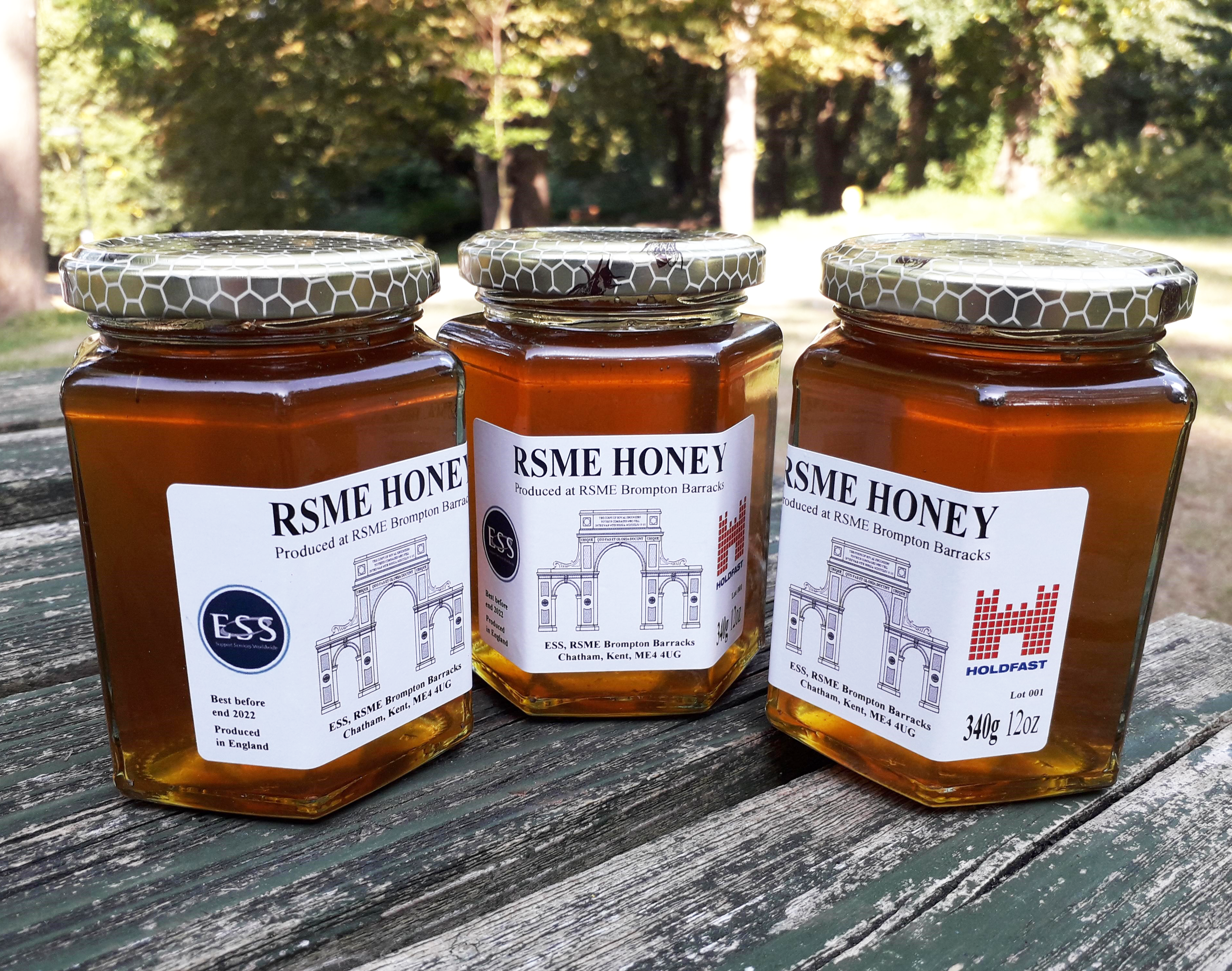ESS Honey Wins Beekeepers Association Award
ESS, the Defence, Energy and Government Services sector of Compass Group UK & Ireland, has won an award at the Medway & County Kent Beekeepers Association Honey Show for the honey produced at its Brompton Barracks site in Chatham. The ESS team has introduced two bee colonies as part of a wider sustainability programme on the site which is home to the Royal School of Military Engineering (RSME). In their first season, the ESS bees produced an impressive 60lbs of honey!
Bringing the bees to RSME required the close collaboration of a variety of stakeholders. Following a site survey, various client risk assessments and agreement of the plan, a partnering group cleared the apiary location – a semi-sheltered position away from busy thoroughfares.
40,000 bees, including two queens, were introduced in December 2020, living in a nucleus box over the winter while they got used to the site. In April 2021, another colony with a further two queens was moved in. After two months, the bees were transferred into two cedarwood hives where they have been thriving ever since. The area has been further developed with the addition of a pond to provide drinking water.
Site representatives from ESS, the MOD and Babcock have completed a 12-week training programme delivered by the British Beekeepers Association and are now qualified to care for the bees.
The project has benefited from a close partnership with the Medway Beekeepers Association, particularly Anthony Edwards who has provided his expertise generously throughout the past year. Following the harvest, Anthony was so impressed with the amount of honey produced that he entered the racks into the Medway & County Kent Beekeepers Association Honey Show where they won first place.
The team were delighted by the success in their first year of beekeeping which has been put down to the location of the barracks close to the Great Lines Heritage Park and River Medway, with a wide variety of flora available, and the characteristics of the apiary which is quiet, sheltered and protected from pollution.
The honey has been decanted into 80 jars which are being gifted to the many people who have contributed to the success of the project. Future harvests will be split between the ESS culinary team for use in their menus and the shop on site to be sold for the benefit of military charities.
RSME is now home to around 100,000 ESS bees and the plan is to extend the learning from the site across more establishments.
Luke Kemp, General Manager – ESS Defence at RSME, said: “When I walk around the site, it’s lovely to see our honey bees in the gardens where we grow fresh ingredients. So many of the site community have shown an interest in the project and I give our clients an update on the bees at our monthly meeting – as we are learning, they are learning too! Our success in our first year of beekeeping would not have been possible without the support of many, including our military client, Babcock, our volunteers and Anthony Edwards from the Medway Beekeepers Association.”
Anthony Edwards, Medway Beekeepers Association, said: “The RSME bee project is so important because there are simply not enough honey bees in the UK to pollinate our fruit and vegetable crops. If every large organisation followed the example of RSME and made land available for similar beekeeping projects, we would be going some way to addressing this problem.
The two bee colonies at RSME Brompton have done very well considering what a poor season it has been for beekeeping in the South of England. The queens in each hive are the Buckfast strain - a hardy insect which is suited to our climate; they overwinter well, conserve their stores, build up quickly in our short season and are able to forage in cool weather. The hives are situated in a sheltered copse which is warmed by the early morning sun. The foraging bees have found plenty of nectar and pollen in the wooded areas and gardens near to the apiary.”
Mark Webster, Managing Director – ESS Defence, Energy and Government Services, said: “We need to look after our bees and do everything we can to halt the decline in numbers. I’m incredibly proud of the work our team is doing at RSME – they are leading the way within ESS having successfully introduced two bee colonies, as well as a community garden to grow ingredients and wormeries to process food waste. How exciting that we have such a successful model to extend across our business, enabling us to positively impact the biodiversity of the environments in which we operate.”

